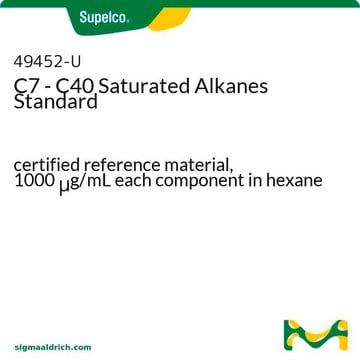모든 사진(6)
About This Item
실험식(Hill 표기법):
C6H3Cl3
CAS Number:
Molecular Weight:
181.45
Beilstein:
956819
EC Number:
MDL number:
UNSPSC 코드:
12190000
PubChem Substance ID:
NACRES:
NA.04
bp:
214 °C (lit.)
vapor pressure:
1 mmHg ( 40 °C)
추천 제품
Grade
HPLC grade
Quality Level
vapor density
>6 (vs air)
vapor pressure
1 mmHg ( 40 °C)
분석
≥99%
양식
solid or liquid
autoignition temp.
1060 °F
expl. lim.
6.6 %, 150 °F
기술
HPLC: suitable
UV/Vis spectroscopy: suitable
불순물
<0.020% water
refractive index
n20/D 1.571 (lit.)
bp
214 °C (lit.)
mp
16 °C (lit.)
solubility
water: insoluble
density
1.454 g/mL at 25 °C (lit.)
λ
H2O reference
UV 흡수
λ: 308 nm Amax: 1.00
λ: 310 nm Amax: 0.50
λ: 350 nm Amax: 0.05
λ: 375-400 nm Amax: 0.01
응용 분야
food and beverages
SMILES string
Clc1ccc(Cl)c(Cl)c1
InChI
1S/C6H3Cl3/c7-4-1-2-5(8)6(9)3-4/h1-3H
InChI key
PBKONEOXTCPAFI-UHFFFAOYSA-N
유사한 제품을 찾으십니까? 방문 제품 비교 안내
애플리케이션
- Application of electrospun polyacrylonitrile/Zn-MOF-74@GO nanocomposite as the sorbent for online micro solid-phase extraction of chlorobenzenes in water, soil, and food samples prior to liquid chromatography analysis: This article explores the use of an electrospun polyacrylonitrile/Zn-MOF-74@GO nanocomposite for the extraction of chlorobenzenes, including 1,2,4-Trichlorobenzene, from various samples. The method shows high efficiency and selectivity, making it suitable for environmental and food safety applications (Amini et al., 2021).
- Facile synthesis and immobilization of functionalized covalent organic framework-1 for electrochromatographic separation: This research involves the synthesis and application of a functionalized covalent organic framework for the electrochromatographic separation of various compounds, including chlorobenzenes like 1,2,4-Trichlorobenzene. The method shows potential for analytical and separation sciences (Bao et al., 2021).
포장
M-Bottle for Solvents
As a global leader in lab reagents, we are constantly looking for new ways to optimize the safety of our products. The newly developed 4L solvent bottle design features advanced sealing technology that eliminates leaks to make the handling of solvents safer and more convenient than ever before.
See all the new features here!
As a global leader in lab reagents, we are constantly looking for new ways to optimize the safety of our products. The newly developed 4L solvent bottle design features advanced sealing technology that eliminates leaks to make the handling of solvents safer and more convenient than ever before.
See all the new features here!
신호어
Warning
유해 및 위험 성명서
Hazard Classifications
Acute Tox. 4 Oral - Aquatic Acute 1 - Aquatic Chronic 1 - Skin Irrit. 2
Storage Class Code
6.1C - Combustible acute toxic Cat.3 / toxic compounds or compounds which causing chronic effects
WGK
WGK 3
Flash Point (°F)
235.4 °F - closed cup
Flash Point (°C)
113.0 °C - closed cup
이미 열람한 고객
Synthesis and characterization of several Ni/NiAl2O4 catalysts active for the 1, 2, 4-trichlorobenzene hydrodechlorination.
Cesteros Y, et al.
Applied Catalysis. B, Environmental, 25(4), 213-227 (2000)
Sorption and cosorption of 1, 2, 4-trichlorobenzene and tannic acid by organo-clays.
Dentel SK, et al.
Water Research, 32(12), 3689-3697 (1998)
The effect of trichlorobenzene solvent geometry on the morphologies of C60 nano/microcrystals produced from solution.
Liu DD, et al.
Materials Research Bulletin, 73, 65-69 (2016)
Jie Cao et al.
The Science of the total environment, 409(11), 2336-2341 (2011-03-29)
Monodispersed carboxymethyl cellulose (CMC)-stabilized Fe-Cu bimetal nanoparticles with an average diameter of less than 20nm were successfully synthesized by a modified water-based approach. The as-resulting particles exhibit a core-shell structure and are quite uniform in size and shape. Batch experiments
Ernest Marco-Urrea et al.
Journal of hazardous materials, 166(2-3), 1141-1147 (2009-01-31)
The degradation of 1,2,3-, 1,3,5- and 1,2,4-trichlorobenzene (TCB) by the white-rot fungus Trametes versicolor was studied. Time course experiments showed a degradation rate of 2.27 and 2.49 nmol d(-1)mg(-1) dry weight of biomass during the first 4d of incubation in
자사의 과학자팀은 생명 과학, 재료 과학, 화학 합성, 크로마토그래피, 분석 및 기타 많은 영역을 포함한 모든 과학 분야에 경험이 있습니다..
고객지원팀으로 연락바랍니다.














